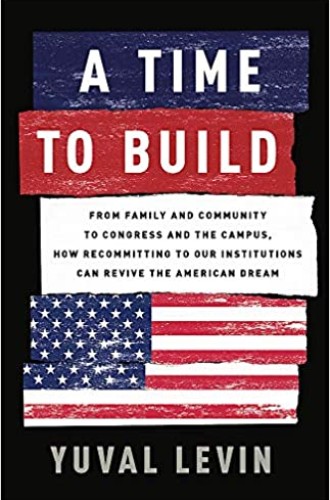Do we still need institutions?
Yes, says Yuval Levin. But only if they serve a formative function.
Theological ethicist James Gustafson believed that one way to understand a particular theology or philosophy is to identify the problem it is trying to solve. In his latest book, political philosopher Yuval Levin sees the problem bedeviling America as the atrophy of our social institutions. And the subtitle—which may set some kind of record for length—clearly identifies what Levin believes to be the solution: “recommitting to our institutions.”
That may be a tough sell these days. For many people, institution has become a negative word, even a triggering word. Institutions can be, and all too often are, disappointing. Sometimes they are crushing.
But not always. Institutions, which Levin describes as durable “forms of association” that are “by their nature formative,” can also be the environments within which people find guidance, direction, belonging, and security.
Levin cuts beneath the way we frame most of our arguments about what’s wrong with our culture, making an argument that runs deeper than the polarities of left and right, red and blue. He finds that our prevailing “despondent mood,” “sense of unease,” and “frustration” have a lot to do with so many of our institutions being on the ropes or counted out. This leaves people feeling increasingly isolated and fearful.
A good part of the reason I went into parish ministry was that I had experienced the church as a crucial formative setting for making it through the crisis known as adolescence. I believe the church has that potential for people at every age and stage.
Here’s where Levin’s book becomes deeply insightful, even revelatory, with respect to understanding what’s going on in our culture. Levin makes the case that our institutions are ailing, in good part, because we no longer look to them to be formative. Instead they have become performative platforms. Rather than forming us in particular values and roles, institutions (now situated within a larger “culture of celebrity”) serve increasingly as a platform for individuals to perform themselves.
As in so many things, Donald Trump serves as an excellent illustration. Trump ignored the norms and culture of the presidency, shaping it into a platform for personal performance and the satisfaction of bottomless needs. When Ohio senator Rob Portman recently announced his retirement, his chief of staff said Portman was bagging it because being a senator is no longer about crafting legislation in order to solve problems. It’s about appearing on TV.
This culture also filters into the institutions that are, for most of us, closer to home. I recently saw an ad for a congregation looking for a new minister. It described the congregation as “unique” and “made up of remarkable and highly gifted people.” “The job of our new minister will be to help us celebrate our gifts and realize our full potential.” Church as performative platform. Minister as emcee.
Something similar happens in schools. Many parents approach a school with the idea that their child is very special, really quite a marvel, and all that’s needed from the school is to support the child, free them to be who they are, and celebrate that identity. It comes as a shock to such parents to hear their very special child may have some knowledge gaps or—heaven forbid!—character defects.
Levin pushes this analysis to a deeper level, getting right into the wheelhouse of churches and synagogues. Do we even think we need formation any longer? The answer to this question reveals something about the doctrine of human nature we’re operating from:
To see institutions as platforms for performance is to deny them their role as molds of character, and by extension to deny our very need for such formation. Both the libertarian and the progressive ideals of freedom assume a human person already fully formed, requiring only liberation from oppression of various sorts to be free.
This assumption about human nature is strong in the Western tradition, and it has only grown in our era of expressive individualism. Remember Rousseau’s idea of the “noble savage”? In a pre-societal state of nature, human beings were pure. We are corrupted by institutions (whether family, school, church, company, or a profession). Within this view, the best course of action is to leave individuals unencumbered, free to be themselves and exercise their capacities.
Such an anthropology is a staple of American popular culture. At the same time, Levin claims, it
has always been opposed in our traditions by a far more skeptical view, which assumes that a person begins imperfect and unformed—not to say fallen. This other ideal comes loaded with rather low expectations of the individual, but it therefore demands a lot of our institutions. It assumes that each of us is born deficient but capable of moral improvement, that such improvement happens soul by soul and . . . is the foremost work of our society in every generation.
Writers throughout history have expressed variations of this perspective, from Augustine to 18th-century political philosopher Edmund Burke to contemporary pundit David Brooks.
All clergy have heard complaints about “the institutional church,” and many have chimed in with some of our own. The upshot of this chorus is that clergy have no real rationale for, and not much confidence in, the church as an institution—the institution they are called to lead and serve. There’s a reason so many contemporary seminarians are attracted to ministry outside churches.
An alternative, implicit in Levin’s work, is to imagine that at least a part of the calling of a priest, minister, or rabbi is what might be called “the pastoral care of a religious institution.” This includes helping to keep an institution true to its core purpose; making it trustworthy and, when it fails in that, repentant; and helping it be a place where the most vulnerable find the security and hope of a loving, if flawed, community capable of forming them in a way of life that is worthy and true.






